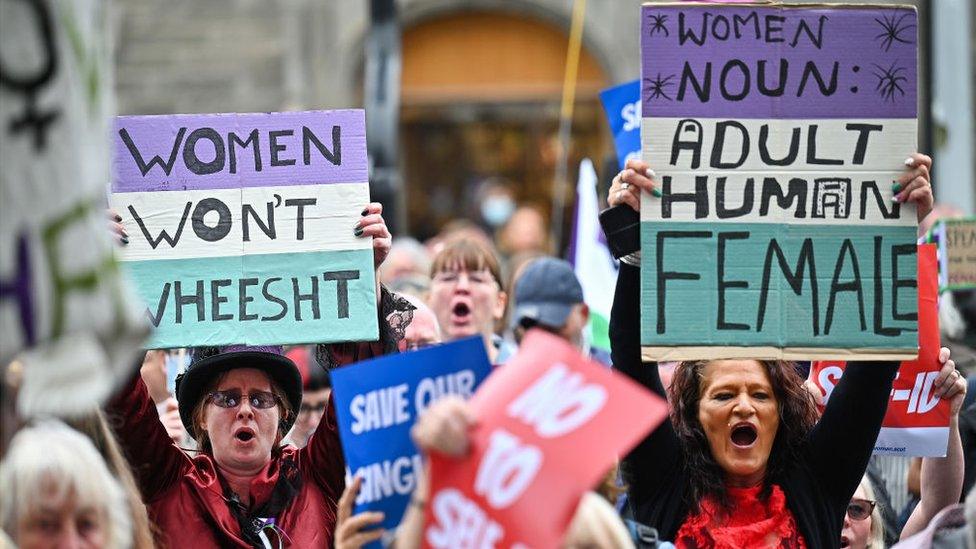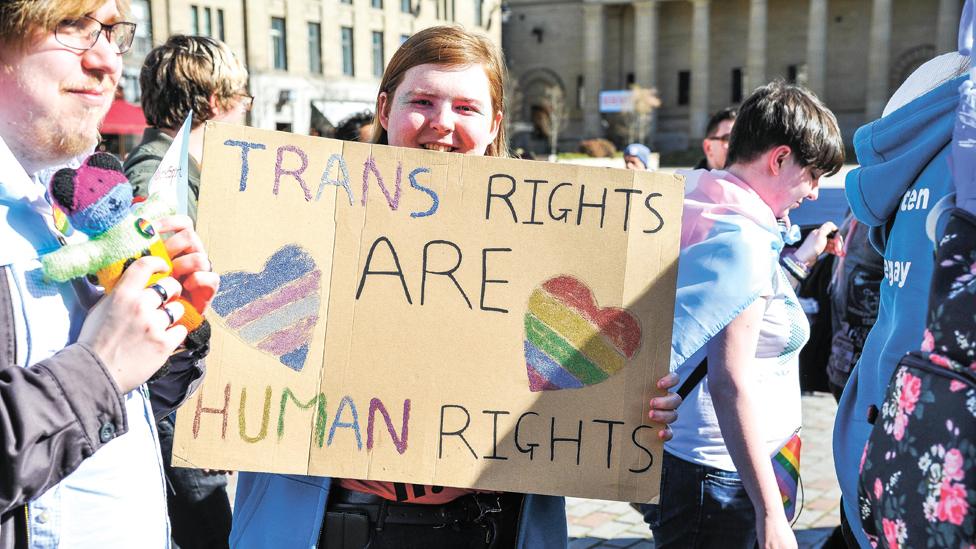Appeal over Court of Session ruling on definition of 'woman'
- Published

Campaigners have held rallies outside the Scottish Parliament
A campaign group is appealing a court's decision over the definition of "woman" in law.
Judge Lady Haldane ruled the definition of sex was "not limited to biological or birth sex" in December last year.
But the For Women Scotland group say treating "sex" as being capable of having different meanings depending upon context is "unworkable and impractical".
It is the fourth time the issue has made it to the Court of Session.
Meanwhile, Lady Haldane is currently considering evidence from the UK and Scottish governments over controversial gender reform laws.
The legislation was passed by the Scottish Parliament last year, but then blocked by UK ministers over its potential impact on equality laws.
The Scottish government is seeking to overturn that decision with a legal challenge at the Court of Session.
However, the case being appealed on Wednesday centres on the Gender Representation on Public Boards Act, which was passed by MSPs in 2018.
The legislation aims to ensure gender balance on public sector boards, and originally stated that the quota should include people who were living as a woman and who either had gone through or intended to go through the gender recognition process.
For Women Scotland argued that ministers had broken with the definitions laid out in the 2010 Equality Act, which includes separate protections on the basis of sex and of gender reassignment.
The group lost an initial judicial review, but were successful on appeal when Lady Dorrian ruled that the bill "conflates and confuses two separate and distinct protected characteristics".

The Scottish government responded by changing the guidance notes for the bill to say that it includes both women as defined by the Equality Act, and people with a gender recognition certificate as defined under the 2004 Gender Recognition Act.
It quotes directly from that act, to say that "where a full gender recognition certificate has been issued to a person that their acquired gender is female, the person's sex is of a woman".
For Women Scotland initially argued that by making reference to sex, the government was "still confusing the protected characteristics and are trying to redefine 'woman' yet again".
However, this was rejected by Lady Haldane, who concluded that: "The revised statutory guidance issued by the Scottish Ministers is lawful".
Five arguments
Now the group are appealing that decision based on five arguments, external, with a hearing beginning on Wednesday.
They say Lady Dorrian's decision established the definition of "woman" under the Equality Act "excludes biological males" - which it says should have been "highly persuasive".
They also argue that treating sex as having different meanings depending on context is "unworkable and impractical".
After Lady Haldane's ruling in December, the Scottish government said it was "pleased to note the outcome of this challenge."
Two other groups - the Equality Network and Scottish Trans - said the ruling "confirmed the position we and many others have understood it to be for well over a decade".
They added: "This ruling does not affect the exceptions in the Equality Act which mean that single-sex services can exclude trans people or treat them less favourable where it is a proportionate means to a legitimate aim.
"In short, the ruling confirms the status quo and the rights of women and trans people under it."
- Published13 December 2022
